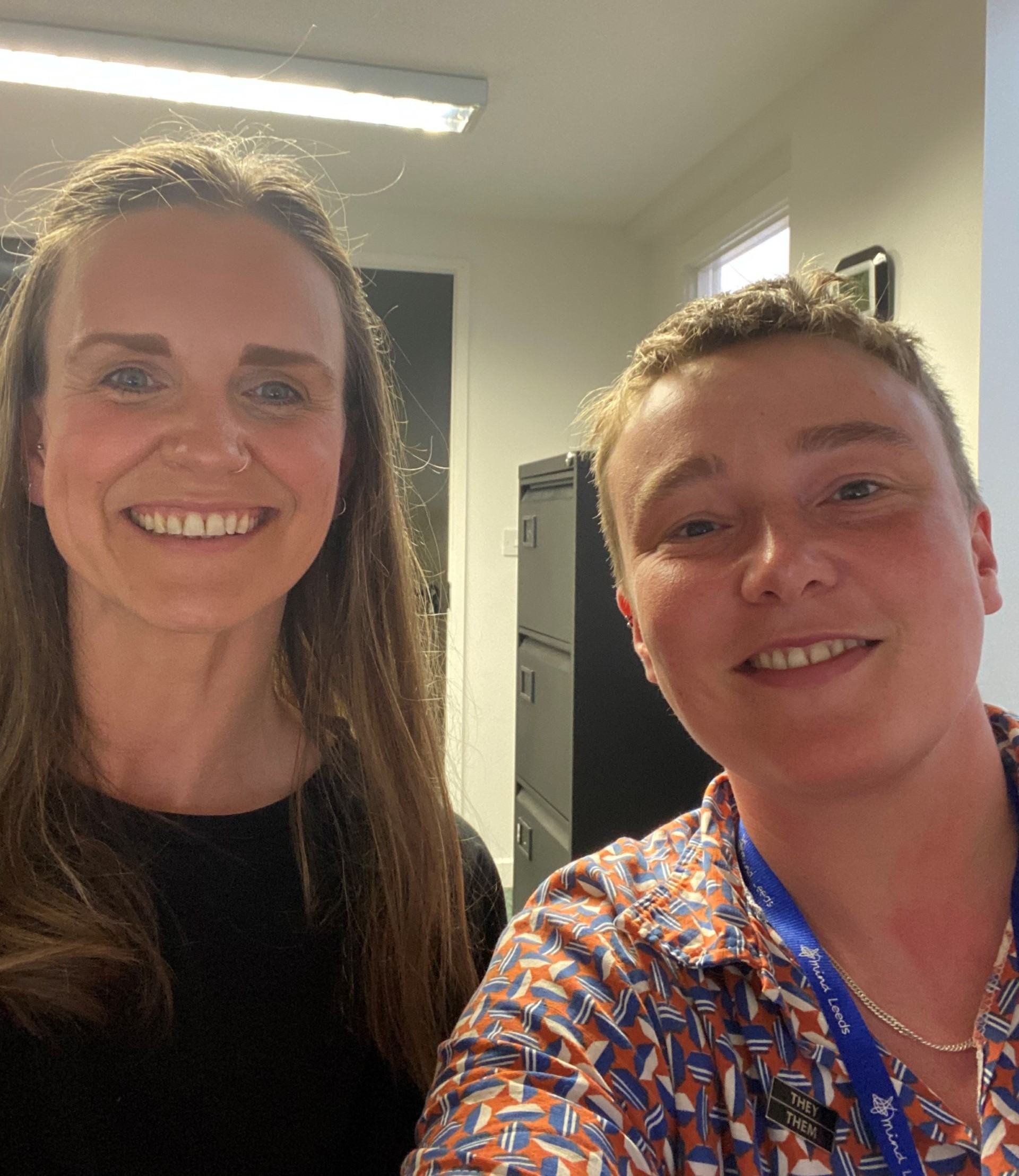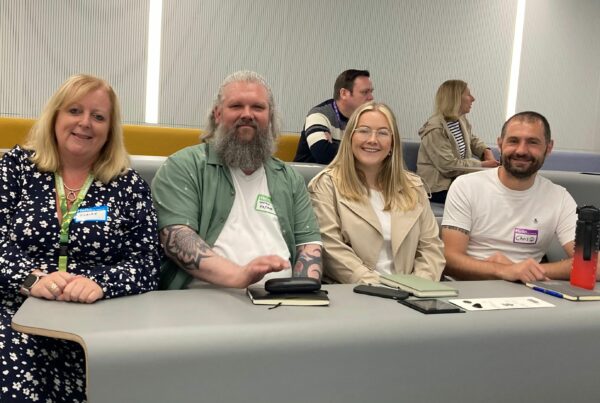Leeds Mindful Employer Network is celebrating International Non-Binary People’s Day!
The annual awareness day, which falls on 14th July 2024, aims to increase understanding and organise around issues faced by non-binary people around the world.
This is relevant to our remit around mental wellbeing at work, as we know that feeling a sense of belonging at work can help towards a sense of psychological safety and assure workplace wellbeing.
Here, Leeds Mindful Employer Co-ordinator, Leigh Staunton (she/her), talks to Cadi Thomas (they/them) about their experience of being open about their identity at work.
Hi Cadi! Tell us a bit about yourself
Hi Leigh, my name is Cadi, my pronouns are they/them. I’m a Young People’s Peer Support Worker at Leeds Mind for the Youth in Mind service. I also chair the LGBTQ+ Voices Network at Leeds Mind. I joined the organisation in 2022 having previously worked in the NHS. I came out (for the first time) as non-binary in 2018. For the first time in my working life, I have been entirely open about my identity at work since joining Leeds Mind.

(L-R) Leigh and Cadi
From your perspective, what indicates that a workplace is a mentally healthy space for a non-binary person?
In my experience as a non-binary person at Leeds Mind, I felt that the organisation was a safe place to be myself from the beginning. I had seen Leeds Mind marching in the Pride Parade before even considering a role there. I was happy to see that I was asked my pronouns on application for the Peer Support Worker Job. Most importantly, at interview I was asked my pronouns, and the panel shared their own pronouns during introductions. That helped to set the scene really for me to be able to have safe and inclusive conversations about identity from the get-go. I think it’s important that employees feel able to have these conversations without fear of judgement.
Can you tell our network members more about the importance of pronouns when it comes to creating mentally healthy workplaces?
It’s important to make pronouns a priority and in the very first instance make sure everyone understands that pronouns are essentially the words we use to refer to people and things (eg. she/her/hers, they/them/theirs, he/him/his, it/its). This stuff needs to be modelled at all levels – not ignored by those who feel it doesn’t apply to them (everyone uses pronouns, that’s the way the English language works).
Non-binary people are all different, have individual needs, hopes and desires. They might use they/them pronouns, a combination e.g. he/they or she/they, or some other pronouns. The only way to know is to ask! Don’t be surprised if people ask yours in return, that’s how conversations happen. Asking pronouns is a way of modelling safety to LGBTQ+ people who can then choose whether to ‘come out’ to you. Coming out is a continual process that lasts a lifetime, and identities are fluid and changeable. Learning more about yourself and your identity is something to be celebrated and congratulated, not denigrated.
Can you model an introduction conversation asking about pronouns for us?
Sure, it’s really simple and not something to be afraid of. Like many things, with practice talking about this will become second nature.
Ultimately, it’s about respect and helping us all to feel like we belong.
A typical conversation with a service user at work where I am introducing myself might go like this:
“Hello, my name’s Cadi, I’m a peer support worker at Leeds Mind, and my pronouns are they/them”
“Hello Cadi, my name’s Sam”
“Hi Sam, nice to meet you, can I just ask what are your pronouns please, if you’re comfortable sharing them with me?”
“What do you mean?”
“These are the words people use to refer to you, for example she/her, he/him, they/them or some other words”
“Oh, I use she/her pronouns”
“Thanks”
Have you got any tips for employers on how to embed the use of pronouns meaningfully?
A really good thing to do is to have posters displayed around the workplace offering tips on how to ask people’s pronouns, and why they are important to people. Seeing these frequently will create the sense that these are conversations that are necessary and safe to have at work. The poster we use at Leeds Mind is linked here.
You could also lead an organisational wide effort to incorporate pronouns into email signatures and modelling introductions including pronouns at the start of meetings. I would add as a caveat that these things should be encouraged with open conversations, but not made mandatory. There are many reasons why someone might not want to share their pronouns. For example, for some people who are questioning their identity, sharing pronouns might be a step they’re not ready for. Others may be right at the start of their journeys in learning about LGBTQ+ experiences and require a bit more learning before they feel confident to share theirs. If you’re asking someone or a group of people to share their pronouns, always remember to add, ‘only if you’re comfortable sharing’.
At Leeds Mind the LGBTQ+ Voices Network and allies co-produced a policy around pronoun use with relevant examples of language, stock responses, organisational rationale which is accessible to all staff.
Tell us more about your ideas on creating inclusive workplaces for non-binary people.
It’s important to have specific organisational policies supporting trans and non-binary people to transition (transition at work policy) and specific guidance on how and when to use pronouns and other terminology that people might not feel comfortable or up to date with. These policies absolutely must be co-produced with trans and non-binary people to ensure they have relevance and are informed by lived experience. That avoids tokenistic efforts. Robust policies and guidance give the sense that people have organisational backing to ‘come out’. Knowing there are specific policies supporting transition and pronoun use gives me confidence as an employee that I’m working for an organisation that cares and that encourages me to bring my whole self to work. It’s a good to review all policies to ensure you’re using inclusive language.
Embed a culture of care, compassion and curiosity. Supporting all staff to feel they can bring their true selves to work is important for everyone. Non-binary people often struggle with ‘visibility’ in the sense that they might not feel ‘seen’ as their true selves at work. They have a legal right to be protected from discrimination – but we can do better, offering true care and support to people whose gender doesn’t align with what they were designated at birth.
A few other things can help, like LGBTQ+ staff networks for peer support, strong EDI training and reporting systems, gender neutral toilets (not just in your workplaces, but at any other venues you’re booking for employees to frequent) not relying on lived experience to lead the way (true allyship), and like I said above, asking pronouns at interview, in meetings, and upon introductions with new people.
Can you talk a bit more about allyship?
Let me first share this definition of allyship: “active support for the rights of a minority or marginalized group without being a member of it”.
Non-binary people cannot be expected to always lead the way in effecting change. Relying on lived experience alone puts a lot of pressure on individuals and limits the scope of positive impact.
I think a marker of a true ally is someone who will stand up for non-binary people when they are not in the room and challenge unhelpful opinions, even if they are the only dissenting voice.
Do you have any advice for challenging unhelpful responses to questions about pronouns?
I think it’s important that people know why we are asking and it’s so that we can create inclusive environments for all people.
We ask for pronouns because we want to refer to people the way they wish to be referred to. It’s about respect and promoting belonging.
Thanks for contributing to this blog, Cadi.
It’s my pleasure. Speaking as a non-binary person who is finally working in an inclusive workplace I can tell you – pronouns are important to me because when you refer to me as I wish to be referred to you are validating my identity and showing support for my experience. It isn’t hard, it isn’t grammatically incorrect (ask Jane Austen about singular they), it doesn’t cost you anything. I would do the same for you.
Thanks for reading!
See below some further useful resources and reading.
Leeds Mindful Employer Network – reflecting on pronouns for Trans Day of Visibility – Leeds Mind
Gender identity, England and Wales – Office for National Statistics (ons.gov.uk)
What it means to be non-binary – LGBT Foundation
Being non-binary in the UK today | Stonewall
What is allyship? A quick guide | Inclusive Employers



